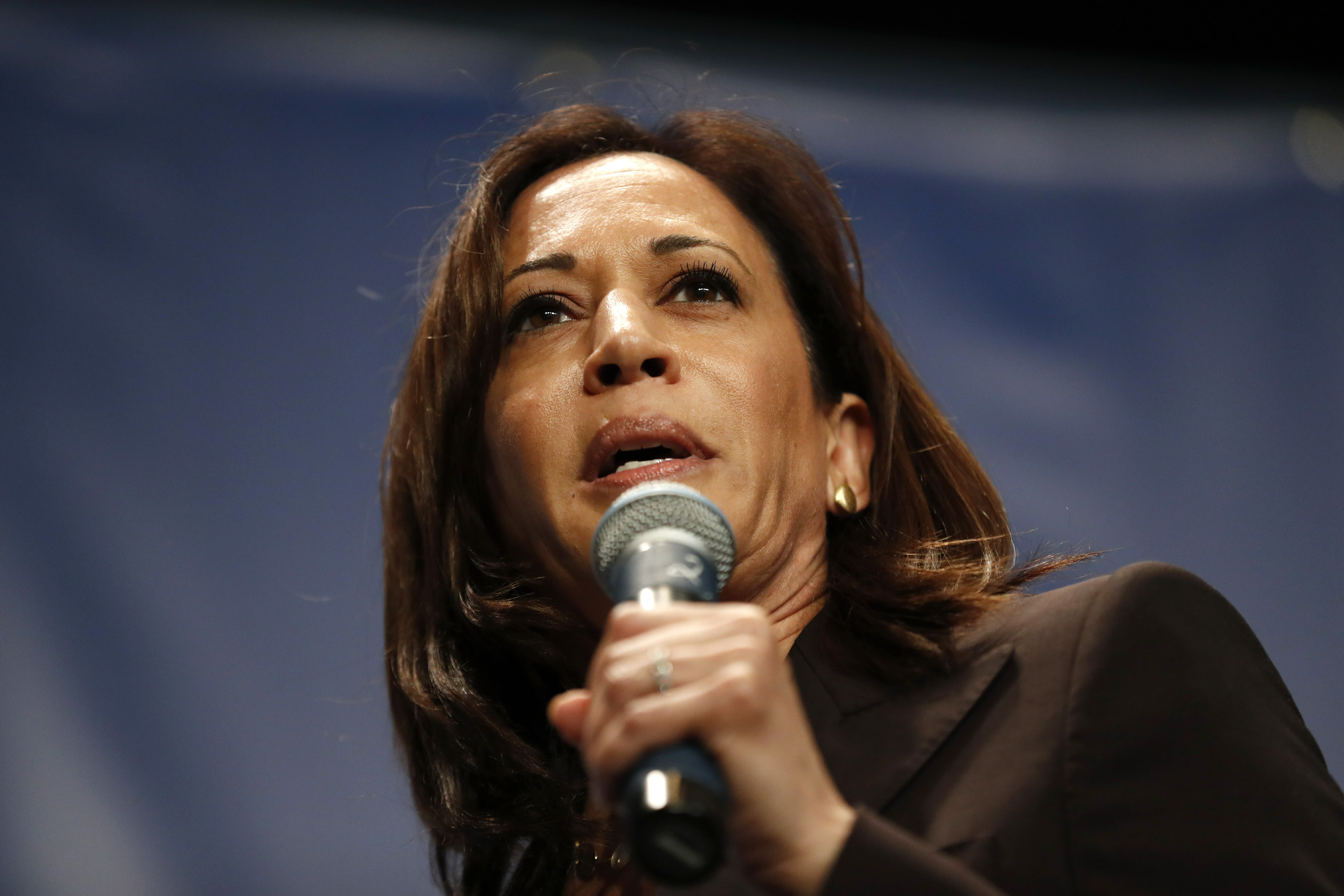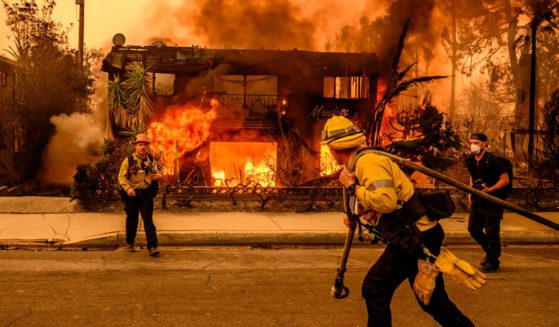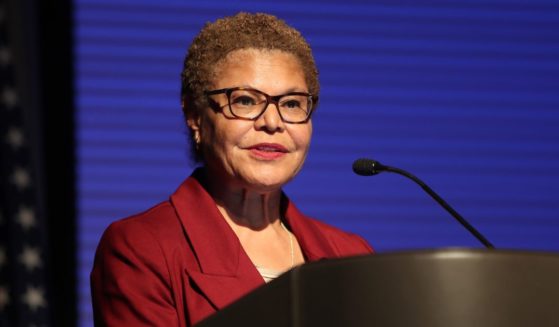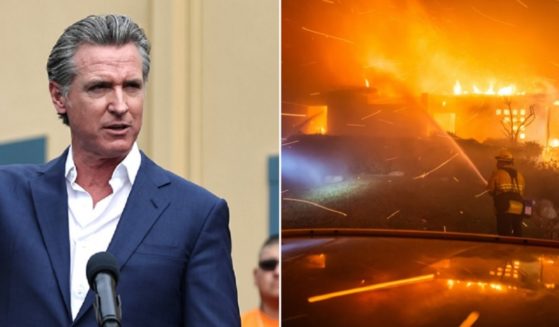
As president, Harris would pursue Trump obstruction case
WASHINGTON (AP) — With a familiar chant, President Donald Trump’s backers regularly called for Hillary Clinton to be thrown in prison during the 2016 campaign. Now top Democrats are grappling with fraught questions about whether to lock HIM up.
As Democrats in Congress press for continued investigation of Trump while he remains in office, the party’s presidential candidates are weighing how to address his alleged misdeeds when he’s no longer in the White House. It’s a question that raises the potential of Democrats politicizing law enforcement, something they’ve blasted Trump for doing.
Democratic presidential candidate Kamala Harris said in an interview released Wednesday that if she wins the White House, her Justice Department “would have no choice” but to pursue an obstruction of justice case against Trump after he leaves office. Fellow 2020 hopeful Pete Buttigieg said that if he beats Trump, he would support a future criminal investigation into Trump.
Harris’ and Buttigieg’s comments come after House Speaker Nancy Pelosi told fellow Democrats that she would rather see Trump defeated in the election and then imprisoned as opposed to being impeached in Congress. That’s partly a way to quiet the push from multiple Democrats vying to replace Trump who want their party to start the impeachment process.
Vowing to seek charges against Trump after he leaves office brings risk for Democratic White House hopefuls, given their own party’s repeated excoriations of the Republican president for politicizing the Justice Department, as when he threatened repeatedly in the 2016 campaign to prosecute Clinton once he became president.
Even the idea of impeachment, though popular with Democrats’ base voters, is shy of majority support with the general public, polls indicate.
Harris’ and Buttigieg’s comments raise questions about how willing Democrats are to keep bending norms of governmental behavior, such as the usually bright line between politics and federal prosecutions, that Trump has shattered.
But Trump, in an interview with ABC, brushed off the Harris statement, mocking her standing in the polls while suggesting that, if he were in her position, he’d probably say the same.
“Oh, give me a break. She’s running for president. She’s doing horribly. She’s way down in the polls,” he told George Stephanopoulos, adding: “Who wouldn’t? Probably if I were running, in her position, I’d make the statement.”
Harris’ spokesman Ian Sams added Thursday that she “believes no one is above the law, not even the President of the United States, and as president, she would restore an independent DOJ that values the rule of law and follows facts and evidence wherever they lead.”
Harris, a California senator and former prosecutor who is running in part on the strength of her legal and law enforcement experience, appeared to have taken a step farther than her opponents in affirming that a Justice Department in her administration “should” look at charging Trump with obstruction after his presidency.
Buttigieg agreed, telling The Atlantic on Wednesday, “To the extent that there’s an obstruction case, then, yes, DOJ’s got to deal with it.”
Buttigieg, the mayor of South Bend, Indiana, cited President Gerald Ford’s pardon of Richard Nixon following the Watergate scandal but said he wouldn’t be interested in pardoning Trump.
“I would want any credible allegation of criminal behavior to be investigated to the fullest,” he said.
Special counsel Robert Mueller, who investigated Russian election interference and obstruction of justice against Trump, has said he was unable to exonerate Trump of obstruction but couldn’t pursue potential charges because of a Justice Department policy that bars the indictment of a sitting president. Harris has said she would ask her Justice Department to reexamine that policy. Democratic Sen. Elizabeth Warren of Massachusetts has pledged outright to end it if she’s elected president.
Mueller examined nearly a dozen acts by Trump for potential obstruction of justice, including his firing of FBI Director James Comey, his request of Comey that he end an FBI investigation into ex-national security adviser Michael Flynn and his involvement in the drafting of a misleading and incomplete statement about his eldest son’s meeting to receive dirt on Clinton.
Nearly half of the more than 20 Democratic primary candidates are calling for the start of an impeachment inquiry. Few contenders, though, are making that stance a centerpiece of their campaigns.
Washington Gov. Jay Inslee said in New Hampshire that the Justice Department has a responsibility to look into whether Trump should be charged, but the process “should not be under the control of the president.” Former Texas Rep. Beto O’Rourke, who’s also in the race, recently said his Justice Department would ensure “accountability and justice,” but he did not commit his administration to pursuing a case against Trump.
Presidents have often avoided politically charged prosecutions when taking office, in the interest of national unity.
Ford’s pardon of fellow Republican Nixon after his resignation was widely panned at the time but later perceived by historians to have helped put Watergate in the past. Barack Obama resisted calls from liberals to launch a widespread investigation into the George W. Bush administration’s post-Sept. 11 domestic spying and torture programs, saying before he took office that “we need to look forward.”
His Justice Department, though, did launch probes of a pair of individual cases, which concluded without criminal charges.
Benjamin Wittes, a senior fellow at the Brookings Institution, wrote in a column Wednesday that presidential contenders should “avoid doing prospective damage to the tradition of presidential administrations not going after their predecessors. Normalizing this sort of rhetoric is extremely dangerous.”
One top Republican warily eyed the “pretty radical” prospect of a Democratic candidate committing a future Justice Department to investigating Trump.
“I think they were pretty offended by the way that the FBI treated Hillary Clinton,” Texas Sen. John Cornyn said of Democrats.
Kayleigh McEnany, press secretary for Trump’s reelection campaign, slammed Harris’ comments.
“Leave it to Democrats to continue peddling conspiracy theories based on their desperate and deranged desire to overturn the results of the 2016 election and trample on the vote of the American people,” she said.
The statute of limitation for seeking obstruction charges, as in most federal criminal cases, is five years from the time an alleged crime is committed. The time limit for charges in conspiracy cases begins at the time of the last act in an alleged conspiracy.
___
Associated Press writers Zeke Miller, Mark Sherman, Eric Tucker, Darlene Superville and Will Weissert in Washington; and Hunter Woodall in Concord, N.H., contributed to this report.
The Western Journal has not reviewed this Associated Press story prior to publication. Therefore, it may contain editorial bias or may in some other way not meet our normal editorial standards. It is provided to our readers as a service from The Western Journal.
Truth and Accuracy
We are committed to truth and accuracy in all of our journalism. Read our editorial standards.
Advertise with The Western Journal and reach millions of highly engaged readers, while supporting our work. Advertise Today.












